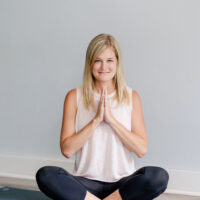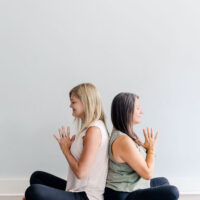Yoga Off the Mat: Second Yama – Satya (Truthfulness)
If you are anything like me, you might consider yourself a pretty truthful person. You don’t go around lying to people, you keep it fairly real and you believe honesty is the best policy.
It wasn’t until I started reading about and studying the yamas that I uncovered the deep work I still need to do in truth. Satya, the second yama, translates into truthfulness. It is the only yama that does not have “non” before it.
I find significance in satya being translated as truthfulness versus non-lying. When I first made this connection, I uncovered my work in this notion of truth. As Deborah Adele says in her amazing book The Yamas and the Niyamas:
“Truth demands integrity to life and to our own self that is more than not telling a simple lie”
Honest comes from the Latin word honestus, which means honorable or respected.
If it is honorable to tell the truth, then why don’t we do it more often? I’ve found, for myself at least, it’s because I’m trying to avoid something in the moment – maybe that’s discomfort, vulnerability or a number of other emotions. I don’t want to disappoint someone, hurt their feelings, feel like an idiot, disclose what’s really going on or deal with the potential for conflict. I still catch myself saying yes when I really want to say no; saying things are ok when they really aren’t; holding back my authentic feelings to keep the peace; pretending like I can take on way more in a day than is actually possible for one human.
My dad is my best example of someone who embodies the spirit of honesty. He’s a man with some pretty strong viewpoints and is not afraid to share them. He’s a person who has no hesitation in stating how he feels, who is willing to have the tough conversations and makes you feel that they always come from a place of love. With Bud, you always know where you stand and you always know the person you are going to get and there’s something refreshing and respectable about that.
Sometimes I catch myself thinking, they just don’t make people like that anymore. When I examine that thought, I come to the very unscientific conclusion that I think we are still created with honesty and integrity very much alive in us, but our increased access to information has made it seemingly more difficult to stay in alignment with Truth (yes, undeniable Truth with a capital “T”.) With so much coming at us, it can be easy to take the things we see and hear at face value without further examination. Our social media feeds are intelligently designed to feed us more of the information we already subscribe to, narrowing our viewpoints and causing us to swear they are the truth. Add to that the thousands of marketing messages we reportedly see every day that can lead us to develop mis-truths about ourselves and others.
While as Gandhi so beautifully writes about in his autobiography (see below), living truth is a lifelong mission, filled with many challenges, there are some practical ways you can begin living with more honesty and nobility right now. This doesn’t mean saying everything on your mind. It means being real. And in order to be real, you’ve got to connect first to the truth of who you are. Getting honest with yourself, your feelings, your strengths and weaknesses; moving from living on an ego level to becoming more spiritually mature. From this place, there is nothing to fear, defend or manage. You are more deeply connected to the best thing to say in each moment. And because you are more deeply connected to yourself, your purpose and Truth, you open up the door for deeper connections with those around you. These “real” connections can be felt. They aren’t surface level; they aren’t filled with canned questions and responses; they are true and hold space for honesty.
Practices
If I could give you one practice, it would be meditation. There is no tool I’ve found more powerful in creating the connection to what is real and true. To kick start a meditation practice, check out my online Intro to Meditation series here.
The second best practice I’ve found helpful in living more truthful is filtering your words. The toughest part about this is learning to take a pause before you react or engage in a tough conversation and ask yourself the following about what you plan on saying. If it doesn’t pass through ALL of the filters, then adjust what you plan to say until it does OR choose to say nothing at all in that moment, perhaps giving the honest response of “I need a moment…”
- Is it truthful? Is it fact, judgment or opinion? Get really clear on this. If it is anything other than fact and you still feel compelled to say it, ensure you preface it with something to the effect of “I acknowledge this is not fact and that it’s my opinion…”)
- Is it helpful? What if everything everyone said was helpful and not hurtful? Ahhh that would be nice! Truthfulness is not saying everything that is on our mind. A lot of what runs through our mind is nonsense that keeps our ego busy and feeling important. If you can’t find a good reason why what you are about to say is helpful to the person you are saying it to, then it’s probably good to not say it at all or at least sit on it for 24 hours and reevaluate. When our emotions drive what we are saying, we often have a mess to clean up later and that’s no fun!
- Is it coming from a place of kindness and/or love? You can feel when something comes from this place in someone else and that feeling can change the whole tone and energy of a conversation.
Another of my favorite Deborah Adele quotes on this notion of satya is, “Living the life that cries to be lived from the depth of our being frees up a lot of energy and vitality.” As they say, the truth will set you free. May you lead with more honesty and uncover your realest, wholest and healthiest self this season. What the world needs is more love and truth.
If you want to explore the yamas deeper, check out our online Embodying Yoga Philosophy Series where you’ll be guided through 5 full length practices centered around each of the 5 yamas. Enroll here.
Alissa Rodgers, eRYT500, is a Columbus, OH based yoga and meditation teacher and the founder and co-owner of GoYoga. She’s been practicing yoga for over 17 years and within the past 6 years, has shifted the majority of her practice toward exploring the philosophy and mindfulness aspects of yoga on a deeper level. This has positively impacted her life in many ways and it’s a true gift to get to share these powerful tools of yoga with others! Catch the GoYoga in person and live stream class schedules here.





